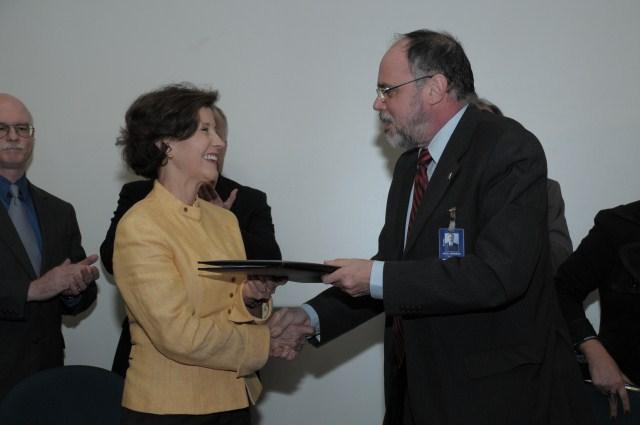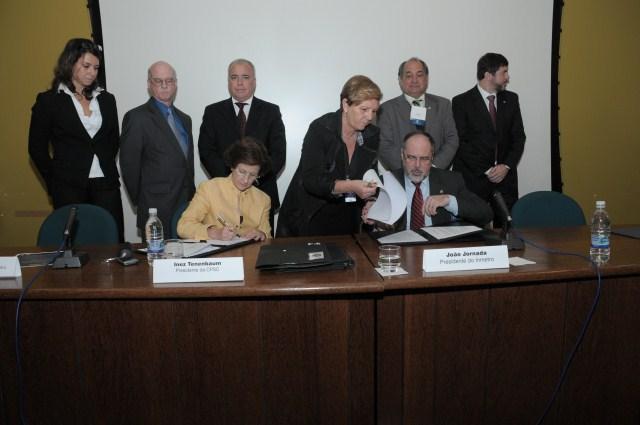WASHINGTON, D.C. - The U.S. Consumer Product Safety Commission (CPSC) renewed a memorandum of understanding (MOU) with Brazil to improve product safety.
Chairman Inez Tenenbaum traveled to Brazil June 10 to renew the MOU between CPSC and the National Institute of Metrology, Standardization and Industrial Quality (Inmetro). The agencies first established an MOU between the United States and Brazil in 2008.
The two agencies have agreed on a plan of work with joint activities designed to foster cooperation to promote consumer product safety in both countries. The signing ceremony took place at Inmetro's Laboratory Campus in Xerém, Rio de Janeiro.
In addition to enhancing information sharing, CPSC and Inmetro will work collaboratively to align product safety requirements whenever possible. A first step in this initiative is to consider the possibility of aligning crib safety requirements. Inmetro intends to work closely with the CPSC to evaluate samples according to the requirements defined in U.S. and Brazilian regulations.
"Brazil continues to be an important partner as we work to ensure safer products," stated Chairman Tenenbaum. "We will share expertise and experiences and expand the flow of information and activities. Together, we will look for the highest levels of safety; we will be proactive, rather than reactive; and we will operate with a renewed focus on injury prevention."
"Further, we will foster cooperative relationships with other regulators, foreign manufacturers and stakeholders, based upon a shared belief that manufacturers should build products to the latest safety standards and regulators should continue to collaborate on the best and safest standards. Together, the CPSC and Inmetro can save lives and reduce injuries," Tenenbaum said.
According to Inmetro's President João Jornada: "Closer collaboration between the two countries is very important. The focus of our work is to protect human beings, and humanity is one, anywhere in the world. This step helps consolidate Inmetro's international outreach. We will count on support from the CPSC, which has state-of-the-art technology to collect, monitor and interpret injury data from a variety of sources. The CPSC is a leader in taking action to educate stakeholders and disseminate technical regulations. They have a success story. Working with the CPSC we will improve our system."
The text of Chairman Tenenbaum's speech and the MOU and Joint Statement issued by the two agencies are available online. (both PDF)

Inmetro President João Jornada welcomes CPSC Chairman Inez Tenenbaum at Xerém campus
in Rio de Janeiro. The two renewed a memorandum of understanding between the two agencies. 
Tenenbaum and Jornada sign the memorandum of understanding. The U.S. and Brazil
have partnered to enhance consumer product safety in both countries since 2008.
About the U.S. CPSC
The U.S. Consumer Product Safety Commission (CPSC) is charged with protecting the public from unreasonable risk of injury or death associated with the use of thousands of types of consumer products. Deaths, injuries, and property damage from consumer product-related incidents cost the nation more than $1 trillion annually. CPSC's work to ensure the safety of consumer products has contributed to a decline in the rate of injuries associated with consumer products over the past 50 years.
Federal law prohibits any person from selling products subject to a Commission ordered recall or a voluntary recall undertaken in consultation with the CPSC.
For lifesaving information:
- Visit CPSC.gov.
- Sign up to receive our e-mail alerts.
- Follow us on Facebook, Instagram @USCPSC and Twitter @USCPSC.
- Report a dangerous product or a product-related injury on www.SaferProducts.gov.
- Call CPSC’s Hotline at 800-638-2772 (TTY 301-595-7054).
- Contact a media specialist.
Please use the below phone number for all media requests.
Phone: (301) 504-7908
Spanish: (301) 504-7800
